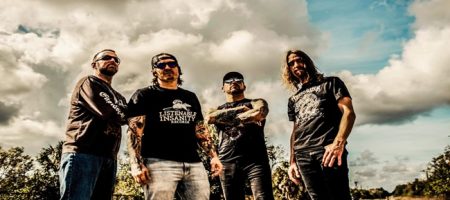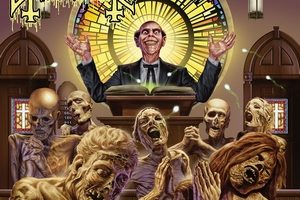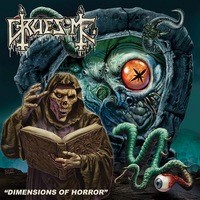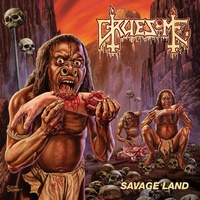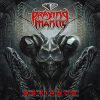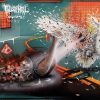Gruesome – Spiritual Succession
Tuesday, 19th June 2018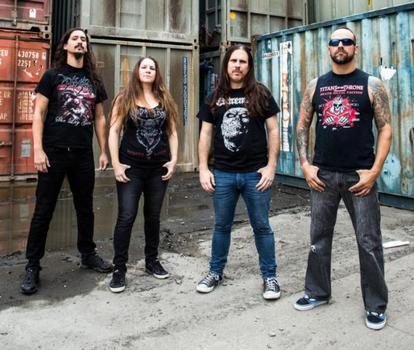
There’s a ton of bands in the death metal world that pay their little homage to Death. Some would say there’s many that worship the band and what they did for the scene. But Gruesome exist in a space where they are actively taking the Death discography and essentially making new ‘versions’ that revere what the band did and work as a second disc. It’s a high bar to shoot for, but currently the band has had no problem in pulling off the first three records.
The recently released Twisted Prayers is Gruesome’s take on Spiritual Healing. An album that saw Death expand beyond the boundaries of their first releases and go into a more melodic/technical and outside the box zone. It’s all done with genuine intent, and because of it, is successful in carrying on the legacy of one of metal’s most beloved. We called up vocalist/guitarist Matt Harvey to talk with us about how the band does some prior research on the Death album in question, his thoughts on the retro movement, and much more.
Dead Rhetoric: What were some of the challenges in crafting Twisted Prayers?
Matt Harvey: As always, one nice thing about Gruesome is that we have a very clear goal – we are a Death tribute band. We have a blueprint to follow, but with each successive Death album, that template gets more complicated. We wanted to embrace that and rise to the challenge. Spiritual Healing, compared to Leprosy and Scream Bloody Gore, is much more melodic and it has more flashy, technical parts going on. That was really the challenge in terms of the writing. To embody that, and make it a convincing [album] and try to follow the leader as much as possible and do it justice.
Dead Rhetoric: So you have something you are shooting at with each album. Does that necessarily make things easier in some regards, or no?
Harvey: Yeah, it does. I’m a big believer in having a structured approach and I embrace limitations. Without limitations, it’s really easy to become unfocused. Out of all the projects I have been involved with, Gruesome has the most limitations and the most structure. We are trying to make new Death albums for people. But at the same time, just because we know where we are going, doesn’t mean it’s going to be easy to get there. I feel like it’s only going to get more challenging as we continue on as a band, because the material that we are going to be paying homage to gets more and more challenging. It will be interesting.
Dead Rhetoric: I can’t think of a better term, but how much research is there in getting the details for the album, in this case, Spiritual Healing?
Harvey: I think research is a really accurate term, because writing the riffs is one thing but that’s only really part of the whole picture. One thing our producer, Jarrett Pritchard, did was had a long phone conversation with Scott Burns about how Spiritual Healing was done: what kind of mics, pre-amps, equipment, and amplifiers were used. I’m sure a lot of the technical details are well above my paygrade. To me, you can really hear the fruits of that research in the record. Regardless of whether the material and the performance is good, sonically, this album is really as similar to Spiritual Healing as you could possibly get. That’s what we wanted. We wanted it to sound like disc 2 of a Spiritual Healing double set or what have you. So there is a lot of research.
Similarly, for the lyrics I spoke to Terry Butler when we were out with Obituary. I had the chance to corner him and punish him a little bit. It’s not the first time I’ve punished him; he’s a very patient man [laughs] putting up with all of my dumb Death questions. But I was talking about what the band was listening to, what they were talking about amongst themselves as far as the lyrics and where the inspiration comes from. I’m sure it’s pretty obvious on Scream Bloody Gore – “Evil Dead” is about Evil Dead, “Regurgitated Guts” is about Gates to Hell…Leprosy is still pretty specific, but Spiritual Healing branches out into a wider realm. I talked to Terry about what my thoughts might have been about what influenced them. He really helped me and gave me some good direction. So there’s definitely an academic element to what we are doing. It’s fun, and we are passionate about what we are doing. But because we are trying to recreate something, you have to understand what it is in order to reverse engineer it.
Dead Rhetoric: Right, which is something that fans are obviously looking at. There’s a ton of bands out there influenced by Death. But when it comes to Gruesome, a more unique aspect. I think the time that you are putting in with those pieces you just mentioned is what is allowing you to push a bit farther and gain some recognition.
Harvey: Because we are a tribute band, we are fans of Death or we wouldn’t be doing this. But just because we know that we are unoriginal doesn’t mean that we aren’t putting our best work forward. I feel like if we didn’t, not only would that be lame in terms of standards for myself: I don’t want to do something half-assed; I’m not into that. But it would be really shitty, because here we are trying to honor someone’s legacy and in our small way contributing to perfecting it – if we half-ass it, it becomes a cash in, or disrespectful. That’s the last thing we want to do or want to be perceived as. It’s always been coming from a place of respect and admiration for Chuck and all the guys in the band, and what they’ve done. It means we have to take it seriously, we have to take it as professionally as possible, and we have to really dig as deep as we can into everything surrounding the albums. That’s the only way that I feel like the project is credible in my eyes, as a Death band.
Dead Rhetoric: You are covering a band that’s pretty well revered throughout the community…
Harvey: It’s not like a situation with Metallica and Diamond Head, where 95% of Metallica fans don’t know anything about Diamond Head. They can just interpret it how they want. With us, all of our fans know who Death is. They are all our fans because they are Death fans. They are going to see right through our bullshit if we produce bullshit, and I appreciate that.
Dead Rhetoric: In continuing to cover Death albums with each new Gruesome – any Death record that you are particularly stoked to get to down the line?
Harvey: I’m really excited about moving forward. People that are familiar with the other stuff that I have done with Exhumed…people who listen to Exhumed probably presume that I’m pretty into Scream Bloody Gore, Leprosy, and Spiritual Healing. That doesn’t seem like too much of a stretch. It’s a little bit more of a personal challenge to start writing and performing stuff that’s in the style of Human, Individual Thought Patterns, and Symbolic because it is more technical and more melodic. It’s more progressive, and it’s something that in my other bands/projects I haven’t done a lot of. To me, it’s like a new territory and it’s slightly intimidating, but it’s slightly invigorating. I’m looking forward to proving to myself that I can pull it off.
Dead Rhetoric: You mentioned the lyrics already but to go further, can you talk about the shift towards more socio-political lyrics instead of the gore-based ones for this album.
Harvey: When I was talking to Terry about what influenced them, I had this idea that there was this old Time-Life book series called Mysteries of the Unknown that talks about various occult things, conspiracies, and unexplained phenomena. It was advertised on TV a lot around the time that Spiritual Healing was released, so I was thinking maybe they were into that “in search of” vibe, or whatever. Terry told me I was making it way too complicated – they were just watching the 6 o’clock news. As soon as he said that, I was like, “Ding!”
I just started to look around at various things and found that there’s still a lot of the same kind of problems and terrible things going on that really aren’t so different from when Spiritual Healing came out. There’s a song called “Killing Spree” on Spiritual Healing, which is about mass shootings, which are a bigger problem now than they were then. So we did a song called “Fatal Illusions” about that. We did a song about the death penalty, “Inhumane,” which seemed like unnatural for a death metal band [laughs]. Obviously, in my opinion, religion is an even bigger problem in this country than ever, with the Evangelical Right infesting the political discourse. “Twisted Prayers” was pretty obvious, because they are talking about all these things like compassion and mercy all the while making the world more merciless, less compassionate, and more dangerous.
As soon as he said the 6 o’clock news, I got a ton of lyrics written in a few weeks and the album was good to go. It’s interesting finding things that are still morbid and very dark, but they ring a little more true on a wider scale than the stuff we talked about before. That said, we still do have a song about a horror movie – “Fate” is about The Dead Zone. The song, “Lethal Legacy” is kind of about a parasitic twin…so there’s still some traditional death metal stuff on there, but most of the songs are a bit more topical.
Dead Rhetoric: You mentioned “Fatal Illusions,” which you put out a video and it has a warning at the front of it. What was your aim with the visual aspect of the track?
Harvey: When I originally wrote the lyrics, I was thinking about the guy who went into a pizza parlor in North Carolina because he thought that Hillary Clinton was running a child sex slavery thing out of the pizza parlor. He went in there with a gun, intending to shoot people up, and luckily he ended up not doing that. I was just thinking about someone who is so convinced about whatever bullshit it is they believe, that they are willing to go out and kill for it.
It’s not like there hasn’t been school shootings, but recently it seems like there are more and more – I read a statistic somewhere that more kids have been shot in school than armed forces this year, which is pretty shocking. It tied in really nicely with that. That’s something that Relapse put together for us, and it’s not an anti-gun song – it’s an anti-mass shooting song. I’m not an anti-gun person per say, but I’m definitely an anti-mass shooting person…I think pretty much everyone is. Obviously whatever it is that we have been doing isn’t working. It’s something that people need to think about and talk about, not only in the metal scene but hopefully people in power, etc.
Dead Rhetoric: I totally hear you on that. I teach myself, and I’m floored by it. Even at my middle school level there are kids that are genuinely concerned about it and wondering why nothing is changing.
Harvey: I don’t blame the kids for being concerned about it. I haven’t been in school for a long time, about 25 years since I graduated high school. If I had kids, I wouldn’t want them to go to a school that looks like a prison with metal detectors and armed guards. That just seems like insanity to me. Without getting too crazy or whatever, I just think that we need to treat guns like cars. You have to take a course and pass a safety test, and get them registered. If you sell them there has to be a record of that. If you have mental health issues or a felon or etc, you can’t buy guns.
I don’t get into the whole ‘ban this gun or that gun’ stuff because then you are getting into what constitutes an assault rifle or whatever. That’s counterproductive. I think most firearm owners would be open to the kind of stuff I’m mentioning. It’s not about taking guns away from people that haven’t broken any laws, it’s about getting a handle on what’s out there and making sure that people who shouldn’t have guns don’t get them. It’ll never be a perfect system – it’s not like the people who are shooting up schools are felons. They aren’t knocking over convenient stores. They are emotionally traumatized people who don’t have the coping capability to work out whatever their issues are, and turn to violence. I would just say to buy a fucking guitar and start a band. It’s a lot better.
Dead Rhetoric: If only we could just hand out the guitar instead.
Harvey: Hey, will if you go to a pawn stop, you can either get a rifle or a guitar. It’s right there.
Dead Rhetoric: Being in a band that’s covering Death albums from long ago, what do you think the appeal is in retro acts?
Harvey: I feel like metal, at this point, if you count the first Black Sabbath album as the first metal album for argument’s sake…it means metal is about 49 years old at this point. It’s a pretty safe bet that over the last 49 years, everything that can or could have been done has been covered. That includes all the cross pollination from rap metal to folk metal to funk metal to classical and metal. There’s metal bands that have accordions I guess. Everything’s pretty much been done at this point. Frankly, I’m amazed that the genre is alive and is as viable as it is. I’m not sure if it speaks to the quality of the music, or lack of imagination of the music producing and buying population, or some combination of both.
I think that at this point, if you are into metal, the weight of the genre’s history is so immense that you are going to be pulled towards the things that defined it for 50 years. You are going to be pulled towards Master of Puppets, Leprosy, Black Metal, Screaming for Vengeance, The Number of the Beast, Savatage, Angel Witch…there’s a million different classic records I could name, and I think because of the Internet, nothing is inaccessible and nothing goes out of print. Not to sound like an old dude, but when I was a kid, if an album was out of print or on a small label with no distribution…I have been buying records since I was 11 pretty constantly. But as an 11 year old, I wasn’t tape trading. If I went to the store and they didn’t have it, I didn’t get it. So now, everything exists. Present and past are in the same space. There’s a natural pull to consume older stuff because it’s there and it informs all of the newer stuff. Because of the culture of metal and the Internet, it’s going to lead a lot of people to the older stuff, or bands that sound like the older stuff.
There’s also the 25 year nostalgia thing. In the ‘70s, Happy Days was a show about the ‘50s. In the ‘80s, The Wonder Years was a hit show about the ‘60s. In the ‘90s, there was That ‘70s Show, they just stopped getting creative with the names. It’s only natural that people are looking back. Maybe 10 years ago, Municipal Waste and Toxic Holocaust were hot, upcoming bands because they sounded like DRI and early Kreator. I think both bands are great, it’s no knock on them, but they were backwards looking bands. I don’t think it’s really anything particularly new. If you look in the ‘90s at records by Sleep or The Melvins, or even some of the Danzig stuff, it’s very backwards looking to the ‘70s. I think that nostalgia is part of human nature.
It’s always easy to think that something before, that you weren’t a part of, was better because your imagination can fill in the gaps. Right now, we are seeing a resurgence in all things ‘90s. I would go to the bar and hear Soft Cell, Duran Duran, and Journey – all that ‘80s stuff. Now I go to the bar and hear mostly ‘90s music – a lot of grunge and stuff. I hate the ‘90s so I don’t know what it is. I just go, “Oh, I remember that song. I hated it then and I still hate it.” But it is a pop culture cycle that things go through.
Dead Rhetoric: Are there any plans for Exhumed at the moment?
Harvey: Exhumed has 4 shows coming up in July. We are going to Puerto Rico and Florida. I’m actually doing a couple shows with Exhumed and Gruesome, so if I die, that’s why [laughs]. Then Gruesome has a European tour after that. Exhumed is going to Europe for a couple weeks just to do some festivals and hit some places when we were in the UK, Scandinavia, Spain, and places like that. Exhumed will also have a US tour later this year that will be announced soon, which is fairly exciting. There’s lots of stuff in the works, and I’m always busy with some shit [laughs]. But that’s the way I like it. I like to keep working.
Dead Rhetoric: Is there anything over here in the US for Gruesome as well, like a full tour?
Harvey: There’s nothing being talked about right now, but in this stage of our trajectory…I hate the term career, it sounds pretentious. But we are at the point where we are able to do a full US tour, because we can ask for what we need to do it right, so we aren’t losing money/jobs/spouses/minds or any of that stuff. We are fortunate to have seen the band grow pretty quickly. We have every intention of doing a full US tour, but I just don’t have anything concrete now. I do think that it’s the next step and it’s something we will solidify fairly soon.











